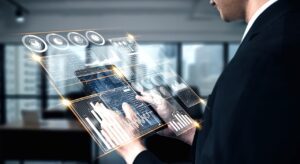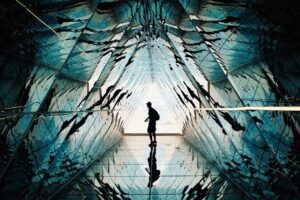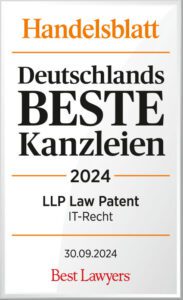Artificial intelligence: Who is the author?

The rapid development of artificial intelligence (AI) in recent years presents start-ups, SMEs and B2B companies with new and complex challenges in the area of copyright. AI-generated works created by generative programs and algorithms raise fundamental questions regarding authorship and intellectual property rights. In the following, we shed light on how the current copyright law in Germany addresses this new reality and what legal implications this has for AI-generated works. This article on “AI and copyright” serves as an initial guide to the complex world of copyright law in the age of artificial intelligence. For detailed advice, our law firm LLP Law|Patent in Munich is ready to competently support your B2B company in this uncharted legal territory.
Can AI generated works be considered “personal intellectual creations?”
In Germany, a work enjoys copyright protection under the Copyright Act if it can be classified as a personal intellectual creation. This is stipulated in Section 2 (2) UrhG (Copyright Act). In order to understand whether AI-generated products can also be classified as a work within the meaning of copyright law, it is first necessary to understand what the term “personal intellectual creation” actually means.
First, the work must have certain characteristics. This means that it must distinguish itself from the “usual” through its individuality and originality, i.e., it must be “different.” The distinctiveness can arise from the form or the content of the work. Obvious things are not protected. Forms that inevitably result from technical requirements or the purpose of use are not eligible for protection.
However, the final requirement is that a person must have created the protected work. Animals, for example, cannot be authors of works. But what about generative AI programs? It is obvious that they are not created by humans either. However, the output of such programs is usually based on specific commands that are entered by the user, a human being. In the context of generative AI, these commands are known as “prompts”. Here, the human behind the machine has their own creative freedom, which can influence the end result. This raises the question of whether the work is nevertheless created by the AI and whether copyright protection therefore does not apply, or whether the machine may only be regarded as a tool through which the human creates a work worthy of protection.
Case law on AI and copyright
There is currently no German case law on this topic. What is interesting, however, is a ruling that attracted attention in the USA in 2023. The Thaler v. Perlmutter ruling concerned an artist who had written an AI program himself, the Creativity Machine, which generates AI-generated images. However, when he wanted to register his copyright for his AI-generated images with the U.S. Copyright Office, he was refused. The reason: Similar to copyright law in Germany, copyright in the US also requires a human creation. Only works that are created by humans can enjoy copyright protection. Thaler then challenged this rejection in court.
The court confirmed the reasoning of the U.S. Copyright Office. If a product is created entirely by an AI system, there is no human contribution to the creation. The images were therefore not eligible for protection. However, the court did not want to categorically rule out copyright protection for AI-generated products. Rather, the court pointed out that such disputes in the future will depend on how the line is drawn between the machine and human contribution to the generated work. How much human input by the user of the AI system is necessary for copyright protection to be recognized? How specific and detailed must the prompts with which the machine is fed be?

Implications of Thaler v. Perlmutter
As you can see, this issue is far from being legally settled, let alone having a clear legal position. It remains to be seen what future case law will say on the subject and the limits of when a work is still the result of human creation and when it is not. In this respect, B2B companies often help themselves by subsequently processing or “refining” the AI-generated results in order to be able to establish protectability. It can also be argued that in cases where a creative human process is merely supported by AI, such as the generation of texts or software by assistance systems such as Github Co-Pilot. As such solutions only make suggestions for the continuation of the work, which can also be rejected or changed, they are subject to protection.
If you have any questions about AI and authorship, please contact our law firm LLP Law|Patent in Munich. We have been successfully advising B2B companies, start-ups, SMEs and medium-sized companies on copyright issues for years.
AI and copyright in data mining
So far, we have looked at the output of AI programs and their copyright implications. However, the input that programmers use to train AI programs is also relevant for copyright law. Many AI systems learn by evaluating huge amounts of data and using this knowledge to generate their own output. This data, regardless of whether it is text, images or other media, often enjoys copyright protection itself. Legally, the question now arises as to whether the use of these sources for AI training interferes with copyright protection.
German copyright law contains two standards in this regard. Both Section 44b UrhG and Section 60d UrhG deal with data mining and allow the use of copyrighted material in this context under certain conditions. Data mining is to be understood as the automated analysis of digital content.

In practice, data mining is generally used to recognize patterns in large data sets in addition to training AI systems. Data mining can therefore also be used for marketing, the analysis of purchasing behavior and in science, for example in medicine. § Section 60d UrhG only protects use in the scientific, non-commercial sector. § Section 44b UrhG applies more generally. At LLP Law|Patent, we will be happy to advise you on the limitations and requirements to be observed here. Contact our law firm in Munich at any time.
Conclusion: Artificial intelligence and copyright law
The new developments in artificial intelligence are therefore highly relevant to copyright law in two areas. One is the protection of the output of generative AI programs and the other is the protection of third-party works that AI systems use for training purposes or that are entered into them by users. At LLP Law|Patent, we guide SMEs and B2B companies through the complex aspects of copyright law in the digital age and help them to make the most of the potential of AI technology. At the same time, we support you in ensuring the protection of your creative achievements. Do not hesitate to contact us for sound advice on all aspects of copyright law.
Sebastian Helmschrott | Rechtsanwalt (Lawyer), Certified Specialist for Information Technology Law, Department Head of IT-Law at BISG e.V.
Mr. Helmschrott is your competent LLP Law|Patent point of contact for contract design, especially for international companies in the field of semiconductors, as well as other modern technologies such as LED/OLED, embedded systems and software-supported processes. He is responsible for the national and international aspects of your IT procurement procedures, as well as IP law areas focusing on licensing and research cooperation.


